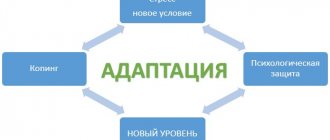Short description
A military psychologist must know well not only his profession, but also the peculiarities of the organization of the internal life of soldiers and officers: everyday life, duties, hierarchy. Constantly monitors military personnel, conducts various types of questionnaires, tests and surveys, and also performs subsequent analysis of the information received.
He independently plans his activities and makes decisions, but coordinates all actions with senior management, which is the basis for clear and correct work. Has deep, up-to-date knowledge of psychology, possesses skills characteristic of the military: taciturnity, diligence, strict subordination, discipline. These specialists have no right to make mistakes, because the latter destabilizes the team and can lead to dire consequences.
Features of military psychology in Russia: the role of the psychologist in the modern army
In the Russian army, the official position of a military psychologist only appeared in 1992. Before that, his duties were partially performed by the military themselves, endowed with the necessary skills and enthusiasm. The position of “regimental psychologist” requires a specialist to have a high level of professional knowledge, understanding the specifics of military service, and possessing the necessary personal qualities.
To date, more than 2,000 jobs have been opened for military psychologists in the Russian Army. The military psychological service has a dedicated structure with a clear hierarchy. The training of specialists is carried out at the military psychological faculty.
Thus, only psychologists who have undergone specialized training and meet the standards of a high-class army psychologist are allowed to serve in the army.
Features of the profession
A military psychologist is a responsible and reserved person who knows how to analyze and store information. He has many responsibilities, because he needs to solve important and complex problems every day:
- professional and psychological selection of people wishing to enter military service;
- development of a set of measures aimed at strengthening discipline, patriotism and combat readiness of personnel;
- psychological preparation, adaptation and rehabilitation of people leaving or returning from a combat zone;
- counteracting negative social, informational and psychological influences to which military personnel may be exposed during their service;
- psychological counseling for military personnel and their family members;
- group classes aimed at developing mental hygiene and psychoprophylaxis;
- psychological resistance and others.
A military psychologist conducts an examination of psychological fitness, assesses the military’s readiness to perform a particular operation, analyzes the situation in a regiment or unit, identifying and correcting problems.
Department of Additional Professional Education
ANNOTATION
to the advanced training program
The purpose of the program is
is to improve the professional competencies of teachers of higher professional education in the field of targeted training in the interests of the Ministry of Defense. The relevant competencies include:
- the ability to apply military psychology data in the educational process;
- ability to carry out research work in an interdisciplinary field;
- the ability to optimize the organizational and managerial activities of a teacher, taking into account the peculiarities of the functioning and development of the human factor in aerospace education;
- readiness for professional self-development based on expanding the range of job tasks using modern psychological knowledge.
The result of the training
is the acquisition
of knowledge and skills
in:
- methodological foundations of military psychology;
- psychological characteristics of modern war and combat operations;
- individual psychological characteristics of military personnel and socio-psychological properties of military groups in a combat situation;
- the use of educational and methodological materials from the disciplines “Military Psychology” in the educational process aimed at training officer personnel for the Armed Forces of the Russian Federation;
- motivational, emotional-volitional, value-semantic, intellectual, communicative qualities of students in the process of mastering the relevant military specialties;
- analysis of the current level of psychological development of students, determination of prospects for further personal and professional development.
Listener category:
teachers of military departments of universities.
VIEW THE CURRICULUM OF THE ADVANCED PROGRAM PROGRAM
| Classroom lessons, distance learning | ||||||||
| No. | Name of sections | Total, hour | Lectures, hour | Laboratory work, hour | Practical classes, seminars, hour | Certification | SRS, hour | |
| hour | form of control | |||||||
| 1 | Introduction to Military Psychology | 18 | 10 | 0 | 8 | 0 | 0 | |
| 1.1 | Subject, tasks, structure, methods of military psychology | 10 | 6 | 0 | 4 | 0 | 0 | |
| 1.2 | History of military psychology | 8 | 4 | 0 | 4 | 0 | 0 | |
| 2 | Methodology of psychological work in the Armed Forces | 18 | 10 | 0 | 8 | 0 | 0 | |
| 2.1 | Psychological work in peacetime | 10 | 6 | 0 | 4 | 0 | 0 | |
| 2.2 | Psychological work during military conflicts | 8 | 4 | 0 | 4 | 0 | 0 | |
| 3 | Psychology of combat | 18 | 10 | 0 | 8 | 0 | 0 | |
| 3.1 | Psychological features of offensive and defensive combat operations | 10 | 6 | 0 | 4 | 0 | 0 | |
| 3.2 | Psychological support for military operations of troops | 8 | 4 | 0 | 4 | 0 | 0 | |
| 4 | Psychological operations in modern conditions | 18 | 10 | 0 | 8 | 0 | 0 | |
| 4.1 | Psychological operations: strategic, operational and tactical tasks | 10 | 6 | 0 | 4 | 0 | 0 | |
| 4.2 | The Scientific Basis of Psychological Operations | 8 | 4 | 0 | 2 | 0 | 0 | |
| 5.1 | Final control | 0 | 0 | 0 | 2 | 0 | Essay | 4 |
| Total | 72 | 40 | 0 | 32 | 0 | 4 | ||
You can get information about the cost and sign up for training using the contacts below:
8;; 8-499-158-43-90
tel./fax: 8-499-158-97-25
Pros and cons of the profession of military psychologist
pros
- Today the profession is available to women (some military universities willingly accept girls for training).
- Stable salary growth as you gain experience and higher military ranks.
- State protection and support, as well as various bonuses and social benefits.
- Training is conducted at universities, and both military and civilians can master the profession. In recent years, there has been a high percentage of budget places.
- Sufficient number of vacancies. Many psychologists who choose a military direction are assigned to work places immediately after graduation.
Minuses
- High responsibility and psycho-emotional stress.
- Interaction with different people, for whose life and health the psychologist is responsible.
- The activity may involve frequent business trips, and you often have to work in hot spots.
- Specialists supervise, lead and advise large groups. A significant workload leads to fatigue, problems during the organization of work processes, and emotional burnout.
How not to entrust a weapon to a psycho - a military psychologist revealed the secrets of his work
Constant rude nagging from superiors can also serve as a trigger for committing a crime, becoming the last straw in a soldier’s overflowing cup of patience. There are many examples of this.
How to recognize the problem in time and prevent a fatal emergency in the department? How can parents who sent their sons into the army learn to sleep peacefully and not be startled by every nightly telephone call in anticipation of very bad news from some army brigade or peacekeeping regiment? In an exclusive interview with CARAVAN, Deputy Chief Military Psychologist of the Ministry of Defense of the Republic of Kazakhstan Arman KALYSHEV lifted some of the veil of secrecy and gave useful recommendations.
The General Staff officer admitted that with his colleagues - military psychologists of brigades and units - he sees through which of the candidates for military service during psychological testing is telling the truth and who is “lying like a gray gelding.”
Psycho is a godsend for a spy
Passing a psychological test, as it turned out, is difficult, but quite possible. Yesterday, the correspondents of “CARAVAN” had such a chance.
The verdict on whether we are fit or not to serve in the Kazakh army was given by a graduate of the Moscow Military Academy, gold medalist, Captain Arman Kalyshev.
His reasoned but categorical conclusion left journalists confused.
“There are a lot of myths about suicide in the army, which are not always true,” says a military psychologist. – For example, for some reason most people think that a person who decides to commit suicide will never tell anyone about it . Don't believe it. Actually this is not true.
A young man who finds himself in a difficult situation will definitely seek help. He will talk about it one way or another with someone, hint, pay attention.
Therefore, it is very important for colleagues who are side by side with him in the same barracks to notice what is happening around him and what he might like to ask for. Suddenly the soldier withdraws into himself, receives a letter from home, walks around with a gloomy look, is sad - he must immediately report his observations to a psychologist. I emphasize: if changes are detected in his behavior or mood, you need to urgently seek help from psychologists who have experience and know exactly how to help your loved ones and friends. Every second can be decisive. A military institute cadet failed an exam and tried to commit suicide: who is to blame?
– Is it so easy for an ordinary soldier to approach an officer in the middle of the day with his own or even someone else’s problems? Should I complain to him and pour out my heart? It’s hard to believe, or rather, I can’t believe at all, that this is possible in a modern army, especially in a purely male team. A psycho is a godsend for a spy. They will laugh at you and begin to bully you even more as an informer.
- Not true. They won't laugh if everything is organized correctly. The army has long introduced and successfully operates a system of companionship, when soldiers are assigned to each other and are even required to conduct observation and report to psychologists about changes in mood.
A psychologist in the army is a responsible profession, and people should be drawn to him. Do not be afraid of him, but, on the contrary, want to communicate with him, trust, ask questions and receive answers.
An important feature of the work of psychologists is collaboration. The main goal is to help a person identify the problem himself, find its solution himself, then assist in implementation, and not just give advice and go aside.
– Do soldiers or officers come to you personally with their problems? During the years of service, was it possible to save at least someone from the noose?
“When I served in Otar, there was a case where soldiers came up to me, and I helped them get out of various stalemate situations.
Who should not be given a weapon?
– Are there risk groups or blacklists in the army where all unreliable or undisciplined soldiers ready to kill are listed?
– We do not call them risk groups, but dynamic observation groups. Yes, such people in the army are under the supervision of specialists, because their character has not been formed or their will is weak. They require a special approach. But they won't always be like that. They will grow up and gain life experience. There is no cross on them. These are not outcasts.
Advice to parents: often ask how your son is doing in the army. Don’t burden him with family problems, call battalion psychologists who know the names of all the soldiers in the unit, what they breathe, what they think about, what they do.
Psychologists have a good handle on the situation because they do not just conduct tests with soldiers according to the plan of the unit commander, but organize weekly trainings and daily conversations. Especially before the company goes on guard duty.
– Can psychologists prevent a soldier from having access to weapons?
– If a serviceman is depressed or, conversely, excited and nervous, he will definitely not go on guard duty.
“A great excuse for lazy soldiers.” Pretend to be crazy and go to sleep, rest, while the rest are dragging out combat service for themselves and for that guy.
– It’s not difficult to identify a simulator. Psychologists have a trained eye. All military personnel want to go on guard duty and attend training exercises. Another thing is that not everyone is allowed to do this.
– Do officers turn to you for help or contract workers? Why do this category of military personnel often experience depression?
“Officers are mainly interested in how to establish contact with growing children and how to properly raise them in the family, so that they can make sense and not go too far. If one of the military personnel experiences grief, a psychologist is also obliged to be there and help in word and deed. "Lip no fool. What's going on in the guardhouse in the Kazakh army
They do not renounce prison, scrip and... a zinc coffin
It happens that just one wrong step, one rude word thrown by a boorish commander in front of the army formation towards an impressionable subordinate or recruit is a tragedy for both. Only one cannot be returned to combat duty from prison, and the other, packed in a zinc box, cannot be brought back to life.
Military psychologists are adamant. It's all emotions. Everything is built on them.
“You must be able to control yourself tightly and never lash out at rudeness and rudeness,” continues Arman Kalyshev. – Do not provoke, do not lead to a state of passion, always control your actions and, possibly, the inappropriate actions of others.
– Be calm like a boa constrictor? If you hurt your honor, hit you on the cheek, then you have to offer another?!
– We must not forget about a sense of proportion. The exposure must be professional. A realistic assessment of what is happening and the ability to make the only right decision.
– Any commander with his usual old army methods of education such as “fell and did push-ups” in front of a modern certified psychologist is now like a rabbit in front of a boa constrictor, like a mouse in front of an elephant, like an ancient Soviet “Zaporozhets” in front of a “Mercedes”. The gap between them is huge.
“We are trying to ensure that this gap does not exist.” So that our specialists are a reliable support and support for commanders, and not a scarecrow. To do this, it is necessary to select knowledgeable people with appropriate education for the positions of psychologists, and not just from among the most conscientious officers of educational structures.
“Even a relatively young psychologist can now freely ruin a career or push some crazy commander into the far corner. He only needs to test a candidate for a higher position and, based on the results of the answers, send the loser to the bench for a long time. In this regard, many temptations arise.
– No, our psychologists are not involved in any corruption scandals. They do not conduct any contractual tests, but draw objective conclusions. The fact that we are fully supported by the leadership of the Ministry of Defense imposes additional responsibility on the department’s specialists. Although, I agree, now some command-level officers endowed with unlimited power do not even dare to look askance at military psychologists, let alone put a spoke in their wheels.
“At the same time, no one is yet able to figure out exactly which military personnel is capable of committing a daring crime, when it will happen and in what place.”
– And this is the same as in the case of an earthquake or tsunami: no one has yet learned to predict their occurrence in time, but it is very possible to reduce the destructive power of the elements and minimize the consequences.
– Did the “CARAVAAN” correspondents pass your complex psychological test? Can we trust weapons?
- Yes, they passed and are fit for military service. You have a low level of anxiety, a normal level of activity and love of life, a sense of importance, strength, energy and vigor. They are not inclined to commit crimes. Common sense, a sober assessment of everyday situations, and a rational approach to solving problems prevail. What Kairat Kozhamzharov learned from a letter from a Kazakh officer
– Does it happen somehow differently?
– It happens sometimes. Our conclusion is then clear: this young man with low personal qualities is not recommended for military service. That is, it is extremely contraindicated for him to approach a weapon. And then everyone can sleep peacefully.
– Recently, on your recommendation, several peacekeepers were literally removed from a flight to Lebanon because they allegedly failed the questions of a psychological test. Everything is so bad and you didn’t let the contract soldiers go to the “hot spot” because they could mess things up there and commit some kind of crime?!
– They didn’t let us through because there were objective reasons for this. But I can’t tell you about the test results. We have a principle of confidentiality.
That is, any information communicated to a psychologist or obtained by him during a personality study cannot be made public.
We also do not have the right to disseminate information and special knowledge that could be used to manipulate people or worsen relationships between them. We are for harmony and safety!
Almaty
Important personal qualities
When talking about who a military psychologist is, it is necessary to understand that his activities take place under conditions of strict restrictions. He interacts with a huge number of people, so he must be an eloquent and very serious person. Military psychologists know how to find a common language with any person, they are able to win over the interlocutor, inspire trust and respect. Their character is dominated by persuasiveness, empathy, objectivity, insight, and sociability.
Psychology of a military personnel: basic skills and work responsibilities of a regiment psychologist
Since there are a number of specific principles in the psychology of a military man, a military psychologist must not only have deep professional knowledge, but also meet the requirements of his position. Responsibilities of the regimental psychologist include:
- understanding the characteristics of the psychology of military personnel;
- observation of socio-psychological processes within the unit;
- promoting the strengthening of military discipline, preventive work to eliminate offenses;
- organization of psychological events that increase the mobilization readiness of employees;
- providing assistance in adapting recruits to the conditions of service;
- providing assistance to family members of military personnel;
- timely informing senior officials about the conduct of psychological measures for personnel;
- carrying out preventive and educational activities;
- assistance and methodological support for classes, development of material and technical base.
The variety of tasks requires an army psychologist to be constantly involved in the service activities of soldiers: the psychologist collects and processes information, determines the personality traits of a serviceman. This data is necessary to prevent intrapersonal and interpersonal conflicts and clarify military specialization.
Training to become a military psychologist
Training of applicants is carried out in the direction of “Psychology of professional activity” (code: 37.05.02). Upon admission, you must pass the Unified State Examination in biology, Russian language, as well as mathematics, society and a foreign language. Last 3 exams to choose a university. Admission conditions depend on the chosen educational institution, the presence/absence of a first education (secondary general education, university) and the applicant’s personal file. In some cases, it is necessary to undergo a state inspection and medical examination, pass standards and an internal exam.
Universities
University of Russian Innovative Education
Psychology of professional activity (Astrakhan branch of the University of Russian Innovative Education)
Moscow State University named after M.V. Lomonosov
Psychology of professional activity (Faculty of Psychology, M.V. Lomonosov Moscow State University)
Orenburg State University
Psychology of Performance (Faculty of Humanities and Social Sciences)
Chelyabinsk State University
Psychology of professional activity (Faculty of Psychology and Pedagogy)
Pyatigorsk State University
Psychological support for the work activities of law enforcement officers (Institute of Human Sciences)
Features of the methods
Typical professional selection for military schools - what is it? Both school graduates and their parents have many questions regarding admission to military schools. Some applicants look in stores for methods of professional selection for military schools in order to prepare for entrance examinations. In fact, it will be a waste of money. Psychological tests for admission to a military school are a secret, so they are not available either on the Internet or in bookstores.
The examination itself lasts several hours. If an applicant does not pass the psychological examination, the Unified State Examination certificates are returned to him, and he does not take the military school physical training exams. He is not allowed to undergo a medical examination either. The only thing he can count on is to simply pack his things and go home.
Categories of professional suitability of candidates
In order to determine the category of professional suitability of a future university student, questions of professional selection for a military school are drawn up by professional military psychologists. The Ministry of Defense of the Russian Federation has developed special guidance on this issue. In full accordance with the instructions presented in this regulation, professional selection for a military school is carried out. The tests are aimed at identifying deviations in the psyche of applicants and the inability to behave adequately when finding themselves in extreme situations. It is during the psychological and professional selection that the following parameters of a potential military school student are assessed:
- motivation to study at a military university;
- adequacy of the idea of the specifics of the future profession;
- assessment of thinking, memory, attention, identifying the level of general intellectual development;
- the presence of qualities that are necessary for military specifics.
They carry out psychological and professional selection by analyzing documents that are included in the personal file of a potential candidate for enrollment in a military school. In addition, psychologists analyze his behavior, conduct interviews, and offer various types of testing.










